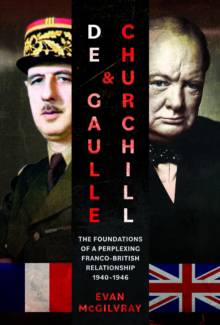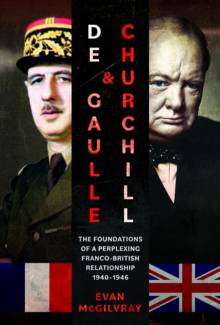
- Retrait gratuit dans votre magasin Club
- 7.000.000 titres dans notre catalogue
- Payer en toute sécurité
- Toujours un magasin près de chez vous
- Retrait gratuit dans votre magasin Club
- 7.000.000 titres dans notre catalogue
- Payer en toute sécurité
- Toujours un magasin près de chez vous
de Gaulle and Churchill
The Foundations of a Perplexing Franco-British Relationship, 1940-1946
Evan McGilvray
Livre relié | Anglais
34,95 €
+ 69 points
Description
De Gaulle and Churchill examines the tense and complicated relationship between General de Gaulle as leader of the Free French on the one hand and Winston Churchill and the British Government on the other.
Evan McGilvray shows that De Gaulle was a career soldier, not a politician by any means, prior to 1940 but stepped into the leadership vacuum after the fall of France to provide a vital figurehead and rallying point for the Free French movement. His experiences in WW1, where he had served with distinction and was decorated but then was captured and so missed the nadir of despair expressed in the mutiny of 1917, meant he did not share the general defeatism of his peers in 1940.
De Gaulle had demonstrated between the wars that he understood modern warfare and the need for modernization and reform of the French forces.
Churchill valued the Free French contribution, particularly the French colonies as bulwarks to the British Middle East and jumping-off points for a Mediterranean counteroffensive, but demonstrated his ruthless willingness to ride roughshod over French sensibilities. This was most famously demonstrated by the sinking of the French fleet to prevent it falling into German hands.
The author traces their difficult relationship from the dark days of the Fall of France, to the final victory, with de Gaulle by then installed as head of the provisional government of the French Republic. This fascinating study concludes with the immediate post-war period, by which time Churchill and de Gaulle had developed a warmer, more mutually respectful relationship.
Evan McGilvray shows that De Gaulle was a career soldier, not a politician by any means, prior to 1940 but stepped into the leadership vacuum after the fall of France to provide a vital figurehead and rallying point for the Free French movement. His experiences in WW1, where he had served with distinction and was decorated but then was captured and so missed the nadir of despair expressed in the mutiny of 1917, meant he did not share the general defeatism of his peers in 1940.
De Gaulle had demonstrated between the wars that he understood modern warfare and the need for modernization and reform of the French forces.
Churchill valued the Free French contribution, particularly the French colonies as bulwarks to the British Middle East and jumping-off points for a Mediterranean counteroffensive, but demonstrated his ruthless willingness to ride roughshod over French sensibilities. This was most famously demonstrated by the sinking of the French fleet to prevent it falling into German hands.
The author traces their difficult relationship from the dark days of the Fall of France, to the final victory, with de Gaulle by then installed as head of the provisional government of the French Republic. This fascinating study concludes with the immediate post-war period, by which time Churchill and de Gaulle had developed a warmer, more mutually respectful relationship.
Spécifications
Parties prenantes
- Auteur(s) :
- Editeur:
Contenu
- Nombre de pages :
- 240
- Langue:
- Anglais
Caractéristiques
- EAN:
- 9781526786463
- Date de parution :
- 04-06-24
- Format:
- Livre relié
- Format numérique:
- Genaaid
- Dimensions :
- 159 mm x 235 mm
- Poids :
- 474 g







